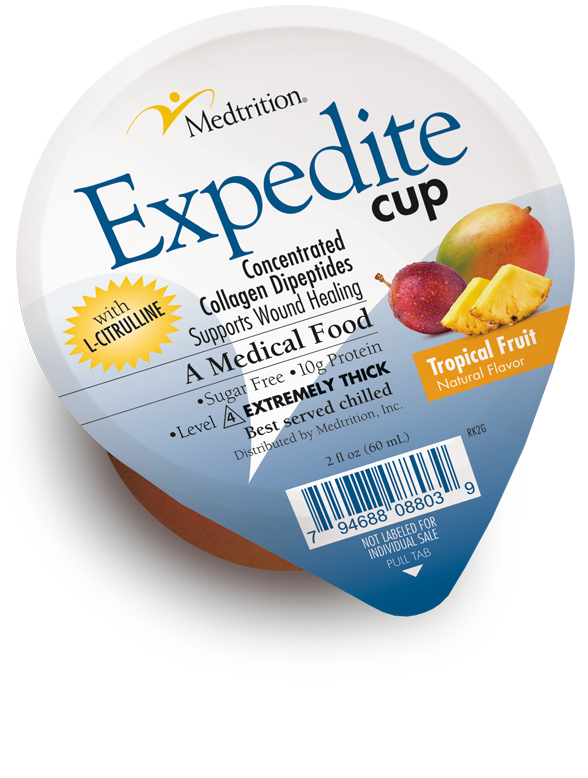From the desk of Dr Nancy Collins,PhD, RDN, LD, NWCC, FAND
 Dysphagia, commonly known as a swallowing problem, can lead to significant health issues, such as dehydration, malnutrition, fatigue, aspiration, pneumonia, and a general decline in functional status.¹ These factors often contribute to skin breakdown and prolonged wound healing.
Dysphagia, commonly known as a swallowing problem, can lead to significant health issues, such as dehydration, malnutrition, fatigue, aspiration, pneumonia, and a general decline in functional status.¹ These factors often contribute to skin breakdown and prolonged wound healing.
Patients with both dysphagia and wounds are challenging to treat because typical oral nutrition supplements for wound healing require the patient to consume 8-fluid ounces/twice daily. This amount of fluid may not be practical for these patients who are frequently prescribed thickened liquids to compensate for swallowing difficulties. Diet modification of food texture and/or fluid consistency is a nutritional approach commonly utilized for dysphagia management. Swallowing thin liquids, such as water, juice, coffee, or tea, requires muscle coordination and control because these fluids are aspirated easily into the lungs, which may lead to pneumonia. A patient who has difficulty consuming thin liquids sometimes is given a liquid with greater viscosity, meaning it is thickened by adding nonfat dry milk powder, cornstarch, or commercial thickeners. This approach requires measuring, mixing, and preparation by the staff only to have many patients consume very little of it or refuse it entirely.
Medtrition® offers a different solution called Expedite™ Cup. This product is currently the only available therapeutic nutrition supplement to support wound healing designed with the dysphagia patient in mind. It is a gelatin consistency that is IDDSI Level 4, extremely thick or spoon/pudding thick and served in a 2-ounce daily portion. Expedite Cup requires no preparation and is served by simply removing the foil lid and eating it right out of the plastic cup. Since the serving size is a small, 2-ounces/day, it is very easy for patients to adhere to this intervention until their wound is fully healed.
Expedite Cup contains a highly concentrated blend of the collagen dipeptides Prolyl-Hydroxyproline (PO) and Hydroxyprolyl Glycine (OG) plus L-citrulline. These highly active ingredients were carefully selected based on current research to support wound healing. These specific collagen dipeptides stimulate fibroblast activity to help build new tissue² while L-citrulline is an efficient and more powerful way to stimulate nitric oxide production when compared to supplemental arginine.³
Visit www.expeditehealing.com for more information and to request a free sample kit in the HCP section.
Reference:
1. Niedert KC. Nutrition Care of the Older Adult: A Handbook of Nutrition throughout the Continuum of Care. Academy of Nutrition and Dietetics; 2016:149-153.
2. Sugihara F, Inoue N, Venkateswarathirukumara S. Ingestion of bioactive collagen hydrolysates enhanced pressure ulcer healing in a randomized double-blind placebo-controlled clinical study. Sci Rep 8, 11403 (2018). https://doi.org/10.1038/s41598-018-29831-7.
3. Agarwal U, Didelija IC, Yuan Y, Wang X, Marini JC. Supplemental Citrulline Is More Efficient Than Arginine in Increasing Systemic Arginine Availability in Mice. J Nutr. 2017;147(4):596-602. doi:10.3945/jn.116.240382.